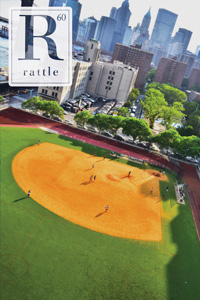Review by Laryssa Wirstiuk
SOMETHING MUST HAPPEN
by Ned Balbo
Finishing Line Press
P.O. Box 1626
Georgetown, KY 40324
ISBN-10 1599244985
2009, 28 pp., $14.00
www.finishinglinepress.com
In a collection that champions nostalgia as a vivid reality, award-winning poet Ned Balbo ignites conversations with the past. Balbo writes, “…everything we hear /is only noise, faint shadows closing in /that fade in fast retreat, as shadows do, /the treasured past more visible, more true.”
Something Must Happen is notable for Balbo’s specificity of language, well-paced lines, grace, and patience for erecting tiny statues in honor of personal and collective memory. The poems in this collection interact with pop culture, reportage, artifact, childhood, friendship, and family.
The poem “Ouija for Beginners” seems to serve as a guide for a reader picking up this collection. How is the reader to interact with the past? Balbo writes: “The Ouija Board requires two believers /seeking favors /of the spirits.” Both the poet and the reader seek some truth, and they must trust that language will help them uncover it in unique ways.
Most of the poems in this collection interact with artifact and memorabilia: newspaper clippings, postcards, and very specific moments in history. “Snow in Baghdad”, which captures a brief snowfall in 2008, was a finalist for the 2008 William Faulkner/William Wisdom Poetry Award. The falling snow is so rare that the city dwellers call it “rain.” Balbo’s sparse yet vivid imagery captures so much more than the weather; it speaks to the political and social climate, surveys the cityscape, and represents a violent clash of cultures.
Characters from past lives inspire questions about morality. “For the Next-to-Last Survivor” is dedicated to Barbara West Dainton, who, at the time of her death, was believed to have been only one of two Titanic survivors still living. Balbo seems to be reminding us that, in the end, each one of us will be the last known survivor of something. The poems in Something Must Happen personalize the survival experience and capture the struggle to survive, even thrive, in both suburban and urban environments.
New York City is a lively and multifaceted character in the series “Times Square Post Cards”, which juxtaposes historical New York City scenes with Balbo’s observations about today’s Manhattan. He reinforces the strong presence and role of language throughout the city’s history. The second poem in the series, “New Times Building, 1900s” asks the reader to consider the energy surrounding the New York Times building when it first opened in a location now known more for its glittering advertisements and New Year’s Eve celebration than brilliant journalism. Almost all Balbo’s subjects are equally influenced by and influencing their environments.
Balbo prioritizes narrative, and his commitment to telling a good story is apparent in “The Woods,” the longest poem in this collection. In this second person poem, the speaker addresses a friend, someone with whom the speaker shared a vivid past. The intimate voice draws the reader into the poem; we consider our own lives, our own childhoods, and the fantasy of growing up in a suburban neighborhood.
Borrowing techniques from fiction and developing a host of characters, “The Woods” brushes against small-town familial conflicts and sex as a mysterious ritual. Balbo writes, “One day, I met your brother’s hippie girlfriend, /midriff bared, disheveled honey-hair /swaying across her shoulders, hips in jeans /as, giggling, she stepped from the used Corvette /who engine Johnny gunned at night for laughs. /We stood together, you and I, bewildered /by this creature: I admired her body, /you, her clothes, your father speaking curtly /on the driveway dirt, mother aghast /at this new adversary.”
My favorite poem in this collection is “A Nonsense Name,” a poem like the others only because it recalls family and home. The way Balbo plays with language and imagery in this poem is unique and extremely memorable. In it, the speaker finds a near-drowned crow with deep blue eyes and names it “Satire,” an homage to both the day (Saturday) and the bird’s sapphire-like eye color.
The bird’s appearance and startling presence in this jewel-like narrative takes flight at the end, jarring the reader. Balbo writes: “Eyes expressionless, /Satire, black feathers slicked down, shook off flecks /of water, glanced up toward the sky, toward us, /head tilted slightly – as if, shocked awake, /he now remembered where he’s meant to go…”. As readers, we can only hope for poetry to awaken us in this way. And remembering the past, as we do while reading Something Must Happen, is the best way to reconnect with the present.
____________
Laryssa Wirstiuk holds an MFA from the University of Maryland, College Park. She is a creative writer and digital marketer obsessed with social networking. In 2008, Laryssa founded Too Shy to Stop (tooshytostop.com), an online arts and culture magazine. She also blogs daily at commansentence.com. Currently, Laryssa is working on a collection of linked short stories called The Prescribed Burn. She can be contacted at: laryssa@laryssawirstiuk.com.



